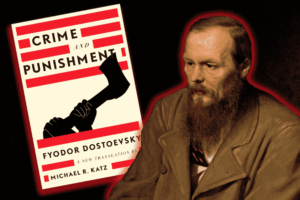Crime and Punishment
Overview
Fyodor Dostoevsky’s Crime and Punishment (1866) is a towering masterpiece of Russian literature. Set in 19th-century St. Petersburg, the novel is a profound exploration of morality, guilt, and redemption. Through its central character, Rodion Raskolnikov, Dostoevsky delves into the human psyche, examining the consequences of rationalizing crime and the existential weight of conscience.
Plot Summary
The story follows Rodion Raskolnikov, an impoverished ex-student who devises a philosophical justification for committing murder. Convinced that extraordinary individuals can transcend moral laws for the greater good, Raskolnikov kills a greedy pawnbroker to test his theory. However, his crime unleashes an internal torment that spirals into paranoia and self-destruction.
As Raskolnikov grapples with his guilt, he encounters various characters, each symbolizing different moral and spiritual ideologies. These include Sonia Marmeladov, a self-sacrificing young woman whose faith and compassion represent redemption, and Porfiry Petrovich, the shrewd investigator who uses psychological tactics to unnerve Raskolnikov. The novel builds to a climactic confrontation, where Raskolnikov must confront not only the law but also his own fractured soul.
Themes
Morality and Justification: The novel challenges the notion of moral relativism, questioning whether some crimes can ever be justified in the name of progress or ideology.
Guilt and Conscience: Dostoevsky explores the psychological toll of guilt, portraying it as a force that transcends rational thought and drives Raskolnikov toward self-awareness.
Redemption and Suffering: Through suffering, Dostoevsky suggests, lies the path to spiritual redemption and human connection.
Poverty and Social Inequality: The harsh realities of poverty are ever-present, influencing the choices and struggles of the characters.
Conclusion
Crime and Punishment is a profound and challenging work that confronts fundamental questions about morality, human nature, and the possibility of redemption. Dostoevsky’s masterful storytelling and psychological insight create a compelling narrative that continues to resonate across generations. While its density and somber themes may not appeal to all readers, for those willing to engage with its depth, it offers an unparalleled literary experience.




